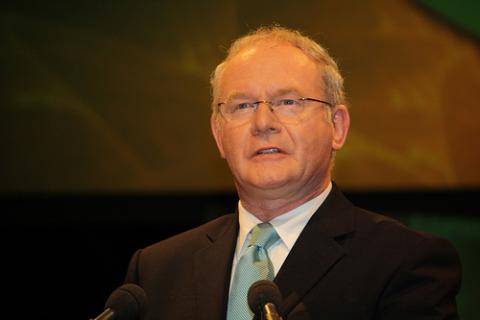What's the problem with McGuinness?

The presidential election campaign is likely to be about Martin McGuinness. Not the presidency, not any of the other candidatures, just McGuinness. That is unless something startling emerges about one of the other candidates or one of them makes a catastrophic faux pas.
Nobody with the profile or stature of McGuinness has contested the presidency since Eamon de Valera last did it in 1966 and nobody before him. De Valera knew well the limitations of the office, for he had devised the Constitution that created the office. Although the presidency is the fulcrum of the institutions of the state, it has no independent powers worth making much of. The office of the presidency is a formality and possibly a decorative one. This might be a problem for McGuinness, who might rail against the inhibitions of the office.
He had an enormous role in the breakthrough of the peace process and in the negotiation of the Good Friday Agreement. He and Gerry Adams brought an almost united republican movement out of its tradition of violence into the arena of politics. That was a considerable achievement. But he has gone beyond that in creating a milieu where the two main representatives of the divided communities can work together in prime ministerial office, with none of the acrimony that was so much part of the interaction of those communities and very little of the suspicion that accompanied it.
He established a relationship of trust, even companionship, with Ian Paisley, the vitriolic scourge of the nationalist community for so long. He did it all over again in establishing a good working relationship with the prickly Peter Robinson, eventually. He has been instrumental in virtually uniting the nationalist community in its acceptance of the new police force, the PSNI, maybe his most important achievement. Before then, he and Adams engineered the decommissioning of the IRA armoury.
All that has been transformative and he has been a central player, along with Adams, Paisley, Robinson, Bertie Ahern,Tony Blair, John Hume and many others. But arguably, what Adams and McGuinness achieved was the most crucial. Al so, the election of McGuinness as president of this state would be the final, irreversible transition by the republican movement (or almost all of it) into politics, into acceptance of the state and the constitutional structure underlying both jurisdictions on the island.
But, but, but... There is his record as a leader of the IRA at a time when the most appalling atrocities were perpetrated and for which as a leader, activist and apologist of the IRA he bears a responsibility. According to the encyclopaedia of killings in Northern Ireland, Lost Lives, the IRA was responsible for 48.8% of all deaths,1,771 out of a total of 3,636.
No other organisation was responsible for anything like that carnage (547 by the UVF, 408 by the UDA, 301 by the British army, 52 by the RUC, eight by the UDR). We do not know the extent to which McGuinness was involved in any of these atrocities, but some people do know and, as the years go by, some of these people are likely to tell their stories. If he is then president of Ireland, it won’t be edifying. Then there is what McGuinness says about having left the IRA in the 1970s. Is this really believable?
I do not know Martin McGuinness but, since 1970, when I first worked in Northern Ireland as a journalist, I got to know many people in the IRA and retained contact with many of them over the years. Some, including people close to McGuinness, indicated that he was a leading member of the IRA, that for a protracted period he was on the army council and IRA chief of staff for a period. Not one of these would have had an animosity towards McGuinness or say something they believed would be to his detriment. So, during virtually all this time, he was, at least indirectly, responsible for the abominations perpetrated by the IRA.
There is, furthermore, the prospect of Áras an Uachtarain being visited every now and again by other known IRA members, people directly or indirectly responsible for the slaughter of some of the 1,771 killed by the IRA. There could also be renewed unionist anxieties if many people here vote for a former IRA leader. But, but, but . . . . Political leaders across the world have been involved in violence and we have no trouble feting them. Richard Nixon for instance, or Ronald Reagan, or Bill Clinton, or George W Bush, or Tony Blair, or Barack Obama or even Henry Kissinger, whose name plenty of Cambodians will remember.
Each of these bears responsibility for the killing of thousands and thousands of innocent people, yet we felt very warm about them coming here. Nor do we feel at all uneasy about the memories of Michael Collins, Cathal Brugha, Seán Lemass, Seán MacEoin, Frank Aiken, Seán McBride, Richard Mulcahy or the members of the first government responsible for the murder of 77 prisoners.
And as for telling the truth, just try counting the lies told by members of this government since they came to office, even over the last week. So what’s the problem with Martin McGuinness?
Image top: Sinn Féin.
